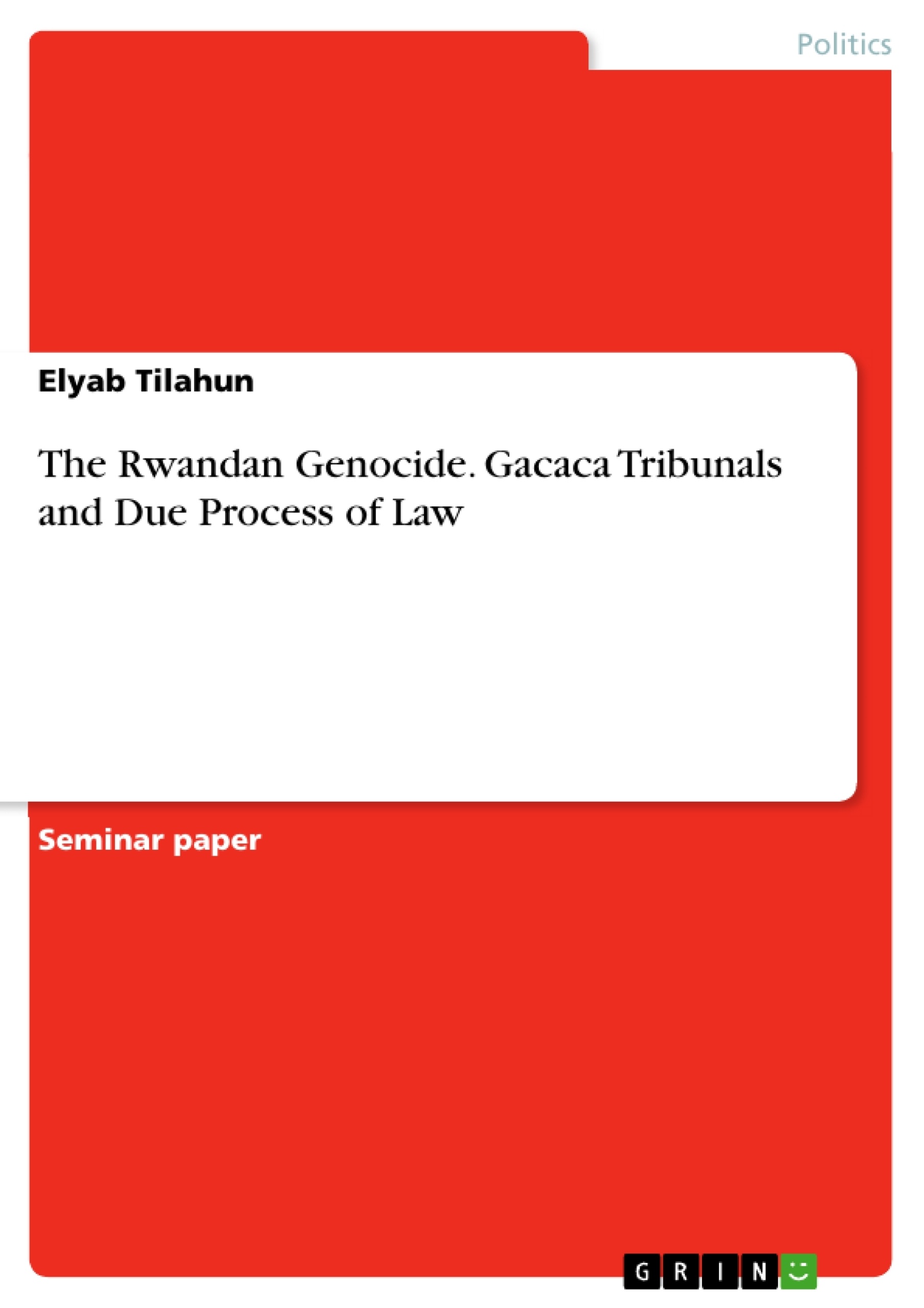The atrocities that occurred in Rwanda have been the issue of the international community for some time now. Books have been written about the evils of the genocide that occurred there. Scholars have had their share of debates and arguments about the issue. Newspapers, government reports and human right organizations have made it their headlines in different events. But after all that has been unfolded in Rwanda, all that was left was over 100,000 suspects and more than a million dead corpses. The government of Rwanda had to devise a system to deal with all those suspects, thus bringing forward a traditional conflict resolving mechanism called the Gacaca tribunals. These tribunals were established in every community and were mandated to address genocide related issues and deal with the suspects. They were also established on the belief that they would bring about transitional justice and reconciliation within the society. These and other factors aside, the tribunals were often criticized for lacking the proper due process aspects of dealing with suspects. The main focus of the paper is to discuss thoroughly these issues and analyze the tribunals on this basis.
Inhaltsverzeichnis (Table of Contents)
- Introduction
- Chapter One: Overview of the Concept
- Genocide Definition
- Genocide, Crimes against humanity, War Crimes and Inhumane Treatment
- Chapter Two: Historical Background of Rwanda's genocide
- How it all started
- Aftermath of the Genocide
- Chapter Three: Gacaca Tribunals- Overview
- Brief history of the Gacaca
- Functions, Purpose and Jurisdiction of the tribunals
- Structure of the Gacaca
- Sanctions employed by the Tribunals
- Advantages and Limitations of Gacaca
- Chapter Four: Gacaca Tribunals and Due process of Law
- The right of the genocidieries to be tried under a competent, impartial and independent tribunal
- The Denial of the right of appeal
- The Right to Counsel
- Right of adequate time to defend oneself
- Presumption of Innocence
Zielsetzung und Themenschwerpunkte (Objectives and Key Themes)
This paper aims to investigate the accusation that Gacaca tribunals lacked due process rights, highlighting the distinct features that separate them from the normal court system. It also explores the role of the tribunals in promoting reconciliation and cooperation within Rwandan society. The paper examines the achievements of the tribunals both within Rwanda and on the international stage, incorporating reports from organizations like the UN and human rights organizations. The paper focuses specifically on the Gacaca tribunals in connection with due process rights of both victims and perpetrators, avoiding broader issues of post-genocide Rwanda.
- Due process rights in Gacaca tribunals
- Distinctive features of the Gacaca system compared to traditional courts
- The role of Gacaca in promoting reconciliation and cooperation
- Achievements of the Gacaca tribunals
- International perspectives on Gacaca
Zusammenfassung der Kapitel (Chapter Summaries)
The first chapter defines genocide and differentiates it from crimes against humanity, war crimes, and inhumane treatment. Chapter two provides a historical overview of the Rwandan genocide, detailing its origins and aftermath. Chapter three offers an overview of the Gacaca tribunals, examining their history, functions, jurisdiction, structure, sanctions, and both advantages and limitations. The fourth chapter delves into the application of due process of law in the Gacaca system, examining the right to a competent, impartial, and independent tribunal, the denial of the right of appeal, the right to legal counsel, the right to adequate time for defense, and the presumption of innocence.
Schlüsselwörter (Keywords)
Key themes and concepts of this work include Rwandan genocide, Gacaca tribunals, due process of law, reconciliation, cooperation, international justice, human rights, and the impact of international organizations like the United Nations.
Frequently Asked Questions
What are Gacaca tribunals in Rwanda?
Gacaca tribunals are traditional community-based conflict resolution mechanisms established to handle over 100,000 genocide suspects and promote reconciliation.
What is the main criticism of the Gacaca system?
The main criticism is the lack of proper "due process of law," including restricted rights to legal counsel and the denial of the right to appeal.
How does the Gacaca system differ from traditional courts?
Unlike formal courts, Gacaca relies on community judges and participation, focusing on restorative justice and truth-telling rather than just punishment.
Did Gacaca trials respect the "presumption of innocence"?
The paper investigates this specific legal aspect, as many human rights organizations raised concerns about the fairness of the trials for the accused.
What was the role of international organizations in Gacaca?
Organizations like the UN and various human rights groups monitored the tribunals and provided reports on their achievements and legal limitations.
- Citar trabajo
- Elyab Tilahun (Autor), 2011, The Rwandan Genocide. Gacaca Tribunals and Due Process of Law, Múnich, GRIN Verlag, https://www.grin.com/document/294679



